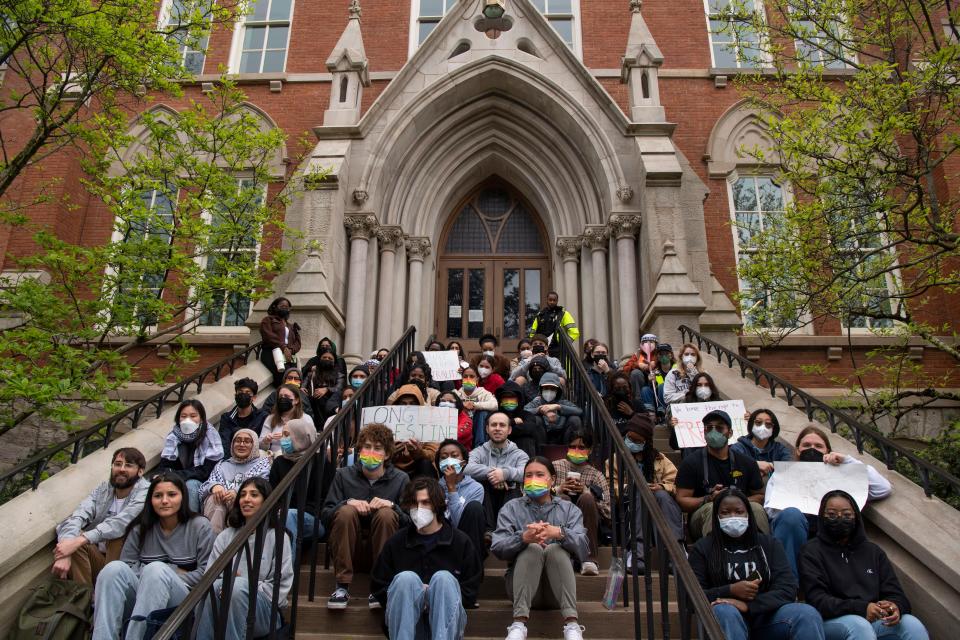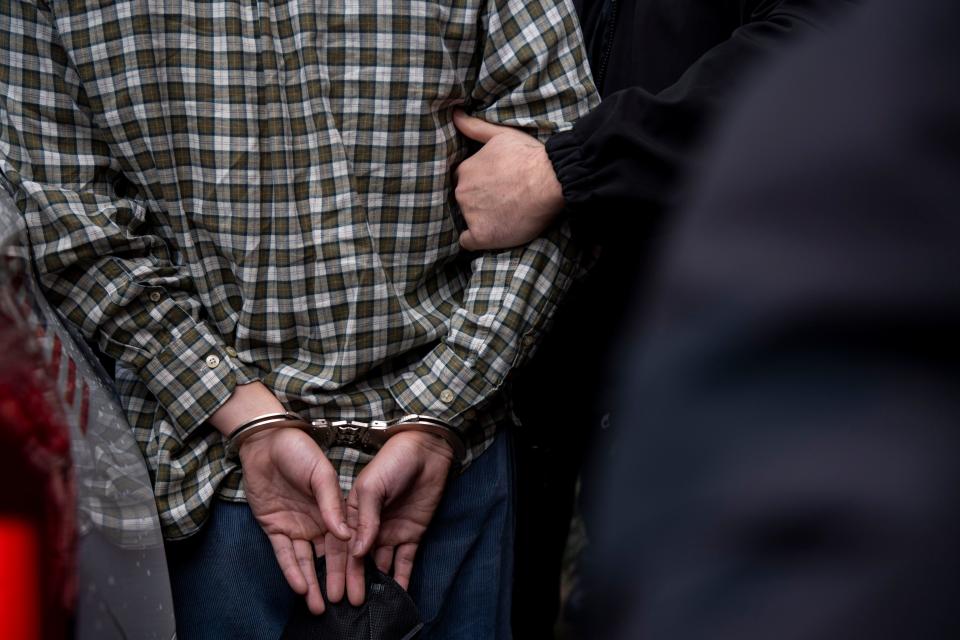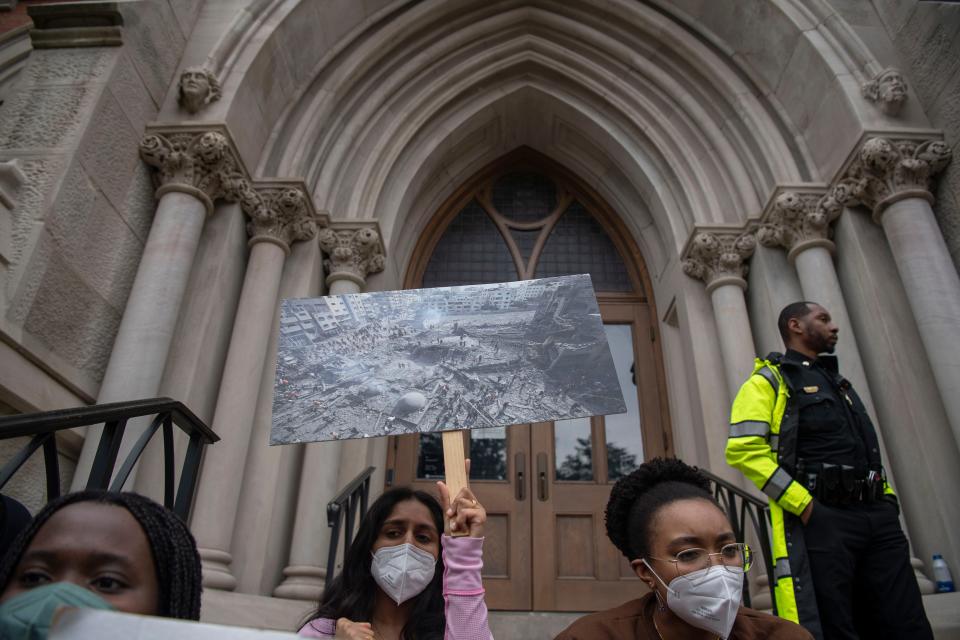Vanderbilt University students protest, arrested at sit-in: What to know
Student protests rocked Vanderbilt University this week after a sit-in at an administration building that began Tuesday resulted in the arrest of four students.
The students began protesting Tuesday morning after an amendment to the Vanderbilt Student Government Constitution, which would prevent student government funds from going to certain businesses that support Israel, was removed by administration officials from a student ballot in late March.

The incident has only been the latest amid ongoing tensions rising on college campuses across the country since the Israel-Hamas war began in October.
Here's what to know.
Why are the students protesting?
More than two dozen students entered Kirkland Hall, an administration building which houses Vanderbilt Chancellor Daniel Diermeier’s office, to hold a sit-in around 9 a.m. Tuesday, along with over 30 more students who sat on the steps outside.
Students at the protest — both inside and out — shouted chants asking for Diermeier to allow students to vote on the amendment that was removed from the ballot by administration.
Reaction: Vanderbilt students activists, like James Lawson before them, are on a quest for justice
The amendment, which garnered over 600 signatures — well above the required amount to be put on the student ballot — followed guidelines from the national Boycott, Divestment and Sanctions movement to prohibit the spending of funds on businesses deemed “complicit” in Israel’s post-1967 occupation of part of Palestine.
It was proposed by Vanderbilt’s Divest Coalition, a conglomeration of around 20 student organizations and over 1,000 students.
How long were students protesting?
Students entered the administration building around 9 a.m., and a second, larger group gathered in front of the building.
Those inside the building stayed for around 22 hours before being escorted out by Vanderbilt University Police.
The students outside protested for hours, with numbers fluctuating as students rotated in and out of class. A number of students stayed outside protesting until the students inside the building emerged.
How many arrests were there?
Three students who sat in the chancellor's office were arrested for assault and bodily injury to another, according to a statement from Vanderbilt University, though online jail records do not currently list any charges.
A fourth student was charged with vandalism after breaking a window on Kirkland Hall Tuesday night.
All four students have been released.
In addition to arrests, students confirmed that interim suspensions were issued to all demonstrators who entered the building.
During Tuesday afternoon’s protests, a reporter from the Nashville Scene was detained and removed from the campus while reporting on the activity. Local media were warned not to enter Kirkland Hall, but in a video posted to social media, the reporter said he wasn't warned about staying off campus.

What are students and faculty saying?
Sam Schulman, a sophomore at Vanderbilt University and member of the protesting group, told The Tennessean that while inside, students were denied access to the building’s restrooms, forcing them to urinate in water bottles.
Schulman said students were determined to make their voices heard inside the building.
“The Chancellor saw us (Tuesday) morning and immediately left,” he said in a telephone call to The Tennessean while he was still inside. “Spirits are good up here. We’re not scared, we’re not deterred. Our demands are clear — we want the right to vote.”
Just days prior to the demonstrations, number of faculty expressed support for the student amendment, going as far as to sign a letter in support of them.
“We, the undersigned faculty, are deeply troubled by the Vanderbilt administration’s decision to suppress a referendum for the adoption of a Boycott, Divestment, and Sanctions (BDS) amendment to Vanderbilt Student Government’s constitution,” the statement, signed by 34 Vanderbilt faculty, read. “We write to affirm the right of students to participate in the BDS movement, to advocate for Palestinian rights on campus, and to engage in student governance free of administration interference.“The recent decision to remove the BDS referendum from the upcoming VSG ballot is a step in the wrong direction. We condemn this suppression of student democracy and demand that the ballot referendum be reinstated.”
What are Vanderbilt officials saying?
The university said it is committed to “free expression” and “civil discourse” but the students’ actions violated university policy and were “not peaceful.”
The university stated that Student Affairs attempted to “deescalate the situation” after the students had “breached” the building, pushing a staff member out of the doorway.
The university released on its YouTube page a video of the students pushing their way into the building.
According to officials, while demonstrations are allowed — along with media presence to cover the event — the campus does, as a matter of policy, "define time, place and manner of limitations” for protests, and require pre-approved clearance from administration for journalists to come on campus.

Spokespeople for the school also stated that the student amendment “proposing Vanderbilt Student Government adopt boycott, divestment and sanctions tactics” was removed by administration because of “potential conflict with federal and state laws.”
The statement said any activity relating to boycotts from the university could make the university “ineligible for new state contracts and could have existing contracts voided.”
When asked if the university had interceded on student voting efforts before, the university said they “(do) not typically intercede on VSG ballots.”
Thursday evening, the university released another statement reaffirming their legal right to "set safety, security, and privacy policies and guidelines" on campus, and to "remove individuals who attempt to violate those policies."
But the university added that the administration would be reviewing the arrest of the Nashville Scene reporter, as well as the campus media policy to "best ensure...commitment to freedom of the press going forward."
Nashville Metro council members weigh in
On Thursday, 20 Metro Council members signed a letter penned by Council member Rollin Horton addressing the widespread concern over the arrest of the reporter and urging the university to embody the free speech principles for which it promotes.
"The arrest of a reporter performing their duty to inform the public of events within our city is not only of concern to the principles of free speech and press, but also undermines the trust between the community and law enforcement," the statement read. "It sends a discouraging message to journalists and media professionals in our community that their essential role in holding institutions accountable is under threat.
"As a prestigious institution of higher learning situated within our community, Vanderbilt University plays a significant role in shaping the values and discourse of our city. We urge you to embody these principles by working to ensure incidents such as this do not occur in the future and that the values of free speech and press are protected."
The USA Today Network - Tennessee's coverage of First Amendment issues is funded through a collaboration between the Freedom Forum and Journalism Funding Partners.
Have a story to tell? Reach Angele Latham by email at [email protected], by phone at 931-623-9485, or follow her on Twitter at @angele_latham
This article originally appeared on Nashville Tennessean: Vanderbilt students protest over Israel-divestment: What to know
